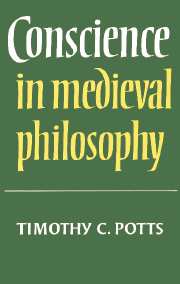Book contents
- Frontmatter
- Contents
- Preface
- Glossary
- 1 Peter Lombard and Jerome
- 2 Philip the Chancellor
- 3 Bonaventure
- 4 Aquinas
- 5 Balance-sheet
- TRANSLATIONS
- Notes on the translations
- Jerome, Commentary on Ezekiel 1.7
- Augustine, On the Trinity, book 12 (excerpts)
- Peter Lombard, Books of Judgements 2.39
- Philip the Chancellor, Summa de bono, treatise on conscience
- Bonaventure, Commentary on Peter Lombard's Books of ‘Judgements’ 2.39
- Aquinas, Debated Questions on Truth 16–17
- APPENDICES
- Bibliography
- Analytical index of subjects
- Index of proper names
- Index of Biblical references
Notes on the translations
Published online by Cambridge University Press: 06 January 2010
- Frontmatter
- Contents
- Preface
- Glossary
- 1 Peter Lombard and Jerome
- 2 Philip the Chancellor
- 3 Bonaventure
- 4 Aquinas
- 5 Balance-sheet
- TRANSLATIONS
- Notes on the translations
- Jerome, Commentary on Ezekiel 1.7
- Augustine, On the Trinity, book 12 (excerpts)
- Peter Lombard, Books of Judgements 2.39
- Philip the Chancellor, Summa de bono, treatise on conscience
- Bonaventure, Commentary on Peter Lombard's Books of ‘Judgements’ 2.39
- Aquinas, Debated Questions on Truth 16–17
- APPENDICES
- Bibliography
- Analytical index of subjects
- Index of proper names
- Index of Biblical references
Summary
1 Quotations. I have translated quotations in the form in which they are given. Medieval writers did not have critical editions of the Bible, the Fathers, etc., at their disposal, with the result that their quotations are often inaccurate. Anyone who looks up the references given should not be surprised, therefore, if the author quoted says something different in that place from what has been attributed to him. Augustine's quotation of Job 28:28 is a good example (cf. Augustine, below, §22). The Revised Standard Version, in general the most accurate among English translations of the Bible, reads:
Behold, the fear of the Lord, that is wisdom;
and to depart from evil is understanding.
This does not support Augustine's distinction between wisdom and knowledge. Instead of ‘devotion’ or ‘worship of God’ the text has ‘the fear of the Lord’ and, in any case, the literary form employed is not one of contrast, but of repetition, in which roughly the same thought is expressed twice, in slightly different ways. To have given the RSV translation of Job 28:28 in translating Augustine would thus have made his argument less intelligible and, in general, it is more important, in the present context, to know what a medieval author thought his ‘authorities’ said than what they actually said.
- Type
- Chapter
- Information
- Conscience in Medieval Philosophy , pp. 75 - 78Publisher: Cambridge University PressPrint publication year: 1980



